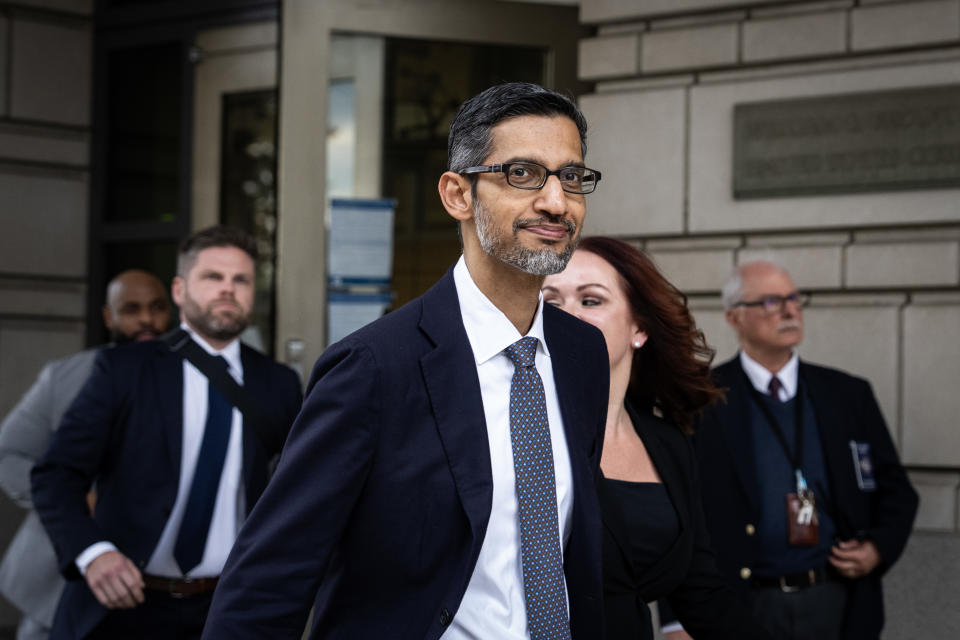A long-standing feud between Google (GOOG, GOOGL) and Microsoft (MSFT) is spilling into public view once again.
The latest shot from Google came in a complaint filed with the European Commission Wednesday, accusing Microsoft of violating the European Union’s antitrust law.
Google said in a document provided to Yahoo Finance that Microsoft illegally leveraged its dominant enterprise server software “Windows Server” licenses to force customers to stick with Microsoft for cloud computing.
Microsoft predicted Google would “fail” in this instance, saying it had already settled similar concerns raised by European cloud providers.
“Having failed to persuade European companies, we expect Google similarly will fail to persuade the European Commission,” a Microsoft spokesperson said.
The new dispute demonstrates “this is a cold war that’s gone hot,” Adam Kovacevich, CEO and Founder of the tech policy advocacy group Chamber of Progress, told Yahoo Finance.
‘Scroogled’
The two tech giants have spent the last two decades battling for supremacy in technologies ranging from online search and cloud computing to the markets for operating systems, gaming software, online advertising — and now artificial intelligence, or AI.
The feud began in the first decade after Microsoft settled a landmark antitrust case brought by the US Justice Department alleging it boxed out rivals by making its browser free and the default on its dominant Windows operating system.
A 2002 settlement opened the door to broader competition in the internet browser software market and created an opportunity for Google, then a startup formed by Stanford students Sergey Brin and Larry Page, to begin its period of meteoric growth in the 2000s.
Microsoft defended its reestablished territory in a series of videos first released in 2011, in which Microsoft skewered Google with parodies suggesting that Google’s competing Gmail service, Chrome browser, and accompanying software lacked quality and privacy.
A video titled “Gmail Man” questioned Google’s ethics by accusing it of mining every word within its Gmail customers’ private emails in order to target them with advertisements.
In other videos titled “Scroogled” and “Googlighting” — a spoof on the 1980s hit television series “Moonlighting” — Microsoft questioned whether consumers should trust Google with handling their private information.
In 2016, the companies entered into a ceasefire with an agreement to end regulatory complaints against each other globally as two new CEOs — Google’s Sundar Pichai and Microsoft’s Satya Nadella — took over.
The pact came to an end in 2021 as regulators in the US and EU stepped up pressure on both companies, and Microsoft complained that Google used unfair tactics to compete in online search and advertising.
‘You brush your teeth, and you search on Google’
Things really got uncomfortable last year during a high-profile antitrust trial that pitted Google against the US Justice Department — a case that alleged Google illegally monopolized the online search engine market and had echoes of the case the DOJ filed against Microsoft in the 1990s.
The most prominent witness to testify against Google was Nadella, who did not hesitate to take a shot at his rival while on the stand.
“You get up in the morning, you brush your teeth, and you search on Google,” Nadella said, emphasizing Google’s overwhelming dominance in the search engine market.
Nadella said Microsoft’s own search engine, Bing, failed to gain traction because Google had negotiated for Google Search to get default placement on browsers, desktops, and mobile devices like Apple’s iPhones and iPads and Android-based smartphones made by Samsung and others.
Nadella went on to describe the imbalance as a “vicious cycle” that he worried would intensify with the development of AI.
Google lost the case in a judge’s ruling that labeled its search business an illegal monopoly. The resolution is now pending a remedies phase that could result in a breakup of Google’s empire.
Microsoft certainly had a lot to gain from a Google defeat, Kovacevich said.
“They were probably the main instigator of the US Justice Department’s antitrust suit over Google,” Kovacevich said. “And the guilty verdict against Google probably stands to benefit Microsoft’s Bing most of anyone.”
Microsoft is taking a similar approach in yet another antitrust lawsuit against Google that is still in its initial trial phase. It argues there that Google’s control of online advertising technologies has harmed the success of its Bing browser.
New feud before the EU
It’s unknown if the EU will take up Google’s most recent attack against Microsoft’s cloud computing rules.
Google is arguing that Microsoft imposed a 400% markup on customers to migrate their Windows Server licenses to a competing cloud service, while customers who chose Microsoft’s cloud services, Azure, could migrate for “essentially nothing.”
In making its case, Google is using the same sort of “bundling” or “tying” claims used in the 1998 case against Microsoft brought by the DOJ.
Back then, US prosecutors alleged that Microsoft illegally monopolized the market for personal computing operating systems by using its Windows operating system to give away its browser, Internet Explorer, for free.
The move bundled the browser along with Windows, eventually putting rival browser Netscape Navigator out of business.
Microsoft was eventually required to open up Windows to third party software, which paved the way for companies including Google to “interoperate” or run their browser and search software using Microsoft-powered computers.
Now, in the market for cloud computing, Google is arguing that Microsoft leveraged “dominance in one market to prevent competition on the merits in a separate, unrelated market,” according to the document shared with Yahoo Finance.
Alexis Keenan is a legal reporter for Yahoo Finance. Follow Alexis on X @alexiskweed.
Click here for the latest technology news that will impact the stock market
Read the latest financial and business news from Yahoo Finance












